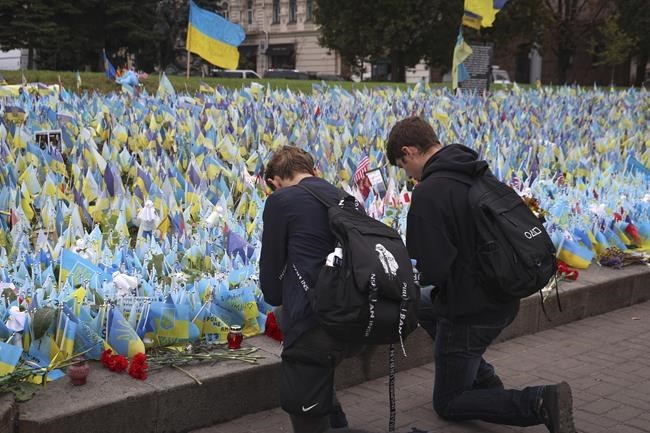OTTAWA — Canada does not plan to press Ukraine to hold a wartime election, focusing instead on broader democratic efforts.
A senior bureaucrat overseeing Europe for Global Affairs Canada told a Senate committee that Ottawa is supporting efforts to weed out corruption and engage civil society.
Alexandre Lévêque said Ottawa would not raise the issue if Kyiv opts against holding a vote, noting that "democracy is about a lot more than just going to vote."
Canadians have had an outsized role in monitoring Ukraine's elections since its independence in 1991.
The country's constitution calls for a vote next spring, but also says one can’t be held during martial law.
During his visit to Ottawa last month, Ukrainian President Volodymyr Zelenskyy said it's logistically complicated to hold a vote when Russia is occupying entire regions and could bomb people gathering in polling centres.
Lévêque added that Canadian officials "are watching and are concerned" about pushback to support for Ukraine coming from the country's neighbours as well as in Washington.
"Actions speak louder than words," he testified Wednesday at the Senate's foreign-affairs committee
"What gets pronounced during an election campaign and what actually happens along with a NATO ally can be very different," he said, adding that Canada has joined countries in signing "multi-year commitments that are much harder to walk back."
Slovakia recently elected a government that ran on a platform of ramping down support for Ukraine, while Poland has reduced arms exports during an election in which farmers have complained Ukrainian crops are undercutting their business.
Meanwhile, there are rumblings within the Republican party calling on the U.S. to pull back its support for Ukraine.
"Sustaining Canadian and international efforts is critical at this time, because Russia continues to bank on Ukraine's allies and partners growing tired," he testified.
"We continue to detect an unprecedented unity among allies and friendly countries, to affect change in a certain historical direction."
Also Wednesday, Lévêque did not directly answer when asked whether Canada had ever mulled linking its foreign aid to poor countries with their support for Ukraine or Russia. He instead told senators that Canada allocates aid based on need.
The idea of curtailing aid for developing countries that have been supporting Russia was floated by the right-wing section of Finland's coalition government, though the idea attracted global pushback and has not been pursued.
Meanwhile, Lévêque told senators that Canada is aware of countries undermining sanctions on Russia by replacing western countries for exports, or moving goods through transit points.
Lévêque said the existing laws don't allow for third-party sanctions. He said Canada tries to work with developing countries such as Indonesia, Brazil and Turkey to have them inform peer nations on how Russia’s invasion of Ukraine is making the world more expensive and less stable.
This report by The Canadian Press was first published Oct. 5, 2023.
Dylan Robertson, The Canadian Press



